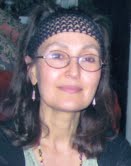
So You Think You Know? (Part 2)
Selma Gokcen
“Sensory appreciation conditions conception; you can’t know a thing by an instrument that is wrong.” -F.M. Alexander.
Our body-mind could be called our home. We live in it from the inside, looking out at the world. It provides our orientation, our focus, our sense of what is right and wrong, up and down, around us, beneath us and above us. All day long we are encountering and interacting with the world; stimuli are filtering through our senses and being evaluated against past experience. The question raised within us after only a few lessons in the Alexander Technique is the same one that F.M. Alexander grappled with for nine years as he searched for answers to the mis-use of his voice: what am I doing and how can I know that I do what I think I am doing? In other words: how reliable are my sensory feedback mechanisms?
In my first Alexander lessons, my teacher used to say: come out of your head and into your body. Let the sensations of your body come into play. I was so accustomed to evaluating a movement rationally—through logic and intellect—that the actual sensation of myself was one step removed. Often I did not realize that my arm or my neck was holding on. I seemed unable to discern levels of tension, let alone subtle, unwanted preparation for movement.
Alexander called this capacity to sense our “sensory register” or “sensory appreciation.” In the early stages of the work, we begin to discover just how “off the scale” we are in our capacity to sense subtle inner movement, the flow of energy along the spine, the freeing of limbs, the lengthening and widening that emerge out of lessening contraction throughout the body. We often encounter something even more bewildering in a lesson—being told by a teacher that we are actually doing the very opposite of what we think we are doing.
As the lessons progress, we may have the occasional experience of rightness, which has little to do with activity on our part. On the contrary, it comes by doing less. Through repeated experiences at the hands of a good teacher, the native intelligence of the body-mind re-awakens, as though it had been asleep for many years. The sleep is the state of tension which we have maintained unawares…we don’t know that we are holding on here and there and everywhere.
What is this native intelligence, and its companion—reliable sensory awareness—and how can we promote its presence in ourselves? My teacher used to say that it cannot be known directly and the moment we strive for it, it is gone. It is there for us in stillness and when we are not trying to do. Through years of proper work—whether it be the Alexander Technique or any discipline which understands and respects the principle of non-doing—our sensory awareness can be honed to recognize interference: the pushing, straining, and making counter-productive effort that negate this body-mind intelligence. Little by little we come to harmonize with that upward flow of energy along the spine. What we intend and what Nature intends for us begin to coincide on a conscious level.
Subjects: Playing Healthy
Tags: Alexander Technique, Awareness, body, cello, cellobello, Gokcen, healthy playing, lessons, Mind, movement, nature, Preparation, progress, repetition, Selma, sensations, Sensory, tension
